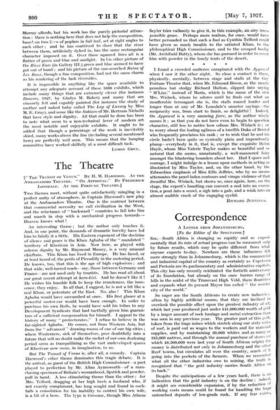The Theatre
]" THE TRANSIT OF VENUS." BY H. M. HARWOOD. AT THE AMBASSADORS THEATRE. " ON APPROVAL." BY FREDERICK LONSDALE. AT THE FORTUNE THEATRE.]
Two themes meet, without quite satisfactorily mingling in a perfect unity of atmosphere, in Captain Harwood's new play at the Ambassadors Theatre. One is the contrast between that commercial necessity we call civilization in the West, and the reluctance of " backward " countries to fall into line and march in step with a mechanical progress towards- Ikaven knows what !
An interesting theme ; but the author only touches it. And, in one point, the demands of dramatic brevity have led him to falsify it a little. His Eastern exponent of the doctrine of silence and peace is the Khan Aghaba of the " mandated " territory of Kherivan in Asia. Now here, as played with solemn dignity by Mr. Raymond Massey, is a very unusual chieftain. This Khan has lived in Europe. He has faced, or at least heard of, the perils of Piccadilly in the motoring period. He knows, too, that this is the age of high explosives ; and that wide, well-tarred roads—say, those between Germany and France—are not used only by tourists. He has read all about our great recent attempt at hara-kiri. And he doesn't like it ! He wishes his humble folk to keep the remoteness, the inno- cence, they enjoy. In all that, I suggest, he is not a bit like a real Khan, or potentate of the East. No, alas ! This Khan Aghaba would have succumbed at once. His first glance at a powerful motor-car would have been enough. In order to purchase his own Rolls, he would have sold his tribes to any Development Syndicate that had tactfully given him guaran- tees of a sufficient compensation for himself. I appeal to the history of many " protectorates. I refuse to believe in the far-sighted Aghaba. He comes, not from Western Asia, but from the " advanced " drawing-rooms of one of our big cities ; where Westerners, sick of themselves, peer doubtfully into a future that will no doubt make the racket of our own deafening period seem as tranquillizing as the vast undeveloped spaces of Kherivan now seem, in imagination, to us.
But The Transit of Venus is, after all, a comedy. Captain Harwood's other theme dominates this tragic debate. It is the arrival, as guest of the British High Commissioner—a part played to perfection by Mr. Allan Aynesworth—of a man- chasing specimen of Britain's womanhood, lipstick and powder- puff in hand. A less stimulating theme than the other ; for Mrs. Telford, dragging at her high heels a husband who, if not exactly complaisant, has long sought and found in cock- tails a consolation for his inability to control his own wife, is a bit of a bore. The type is tiresome, though Miss Athene
Seyler tries valiantly to give it, in•this example, an airy irres- ponsible grace. Perhaps more realism, for once, would have better persuaded us that such a fool as Cynthia Telford could have given so much trouble to the satiated Khan, to the philosophical High Commissioner, and to the escaped booby (Mr. Archibald Batty), whom she has pursued in order to cover him with powder in the lonely tents of the desert.
* * I found a crowded audience enraptured with On Approval when I saw it the other night. So close a contact is there, physically, mentally, between stage and stalls at the tiny Fortune Theatre that, when Mr. Edmond Breon, as the nearly penniless but stodgy Richard Halton, slipped into saying " M'Liar," instead of Maria, which is the name of the rich Mrs. Wislack, whom he adores until he finds out what an insufferable termagant she is, the stalls roared louder and longer than at any of Mr. Lonsdale's smarter sayings—the reciprocity was, from start to finish, so delightful ! Indeed, On Approval is a very amusing farce, as the author wisely names it ; so that you do not have even to begin to question character, still less to notice how odious Mrs. Wislack is ; or to worry about the loafing ugliness of a twelfth Duke of Bristol who frequently proclaims his rank ; or to wish that he and his circle hadn't been quite so cynically plain and impenitently plump—everybody in it, that is, except the exquisite Helen Hayle, whom Miss Valerie Taylor makes so beautiful and so natural that she seems, unnaturally, a well-mannered fairy amongst the blustering bounders about her. Had I space and courage, I might indulge in a lesson upon methods in acting as illustrated by Miss Taylor, and, on the other hand, by the Edwardian emphasis of Miss Ellis Jeffries, who by no means attenuates the pearl-laden contours and virago violence of that dreadful Mrs. Wislack, but shows us, once again, how, on the stage, the expert's handling can convert a nod into an execu- tion, a pout into a scowl, a sigh into a gale, and a wink into an almost audible crash of the engaging eyelid.
RICHARD JENNINGS.














































 Previous page
Previous page